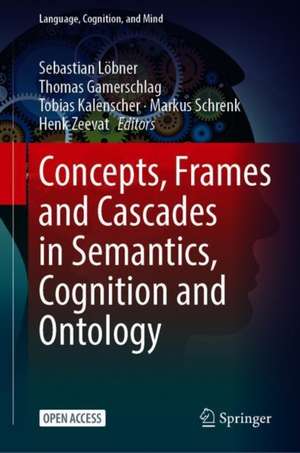Concepts, Frames and Cascades in Semantics, Cognition and Ontology: Language, Cognition, and Mind, cartea 7
Editat de Sebastian Löbner, Thomas Gamerschlag, Tobias Kalenscher, Markus Schrenk, Henk Zeevaten Limba Engleză Hardback – 29 mai 2021
Frames are a key topic covered which have had a strong impact on the exploration of knowledge representations in artificial intelligence, psychology and linguistics; cascades are a novel development in frame theory. Other key subject areas explored are: concepts and categorization, the experimental investigation of mental representation, as well as cognitive analysis in semantics. This book is of interest to students, researchers, and professionals working on cognition in the fields of linguistics, philosophy, and psychology.
Preț: 440.60 lei
Nou
Puncte Express: 661
Preț estimativ în valută:
84.31€ • 88.02$ • 69.78£
84.31€ • 88.02$ • 69.78£
Carte tipărită la comandă
Livrare economică 04-18 aprilie
Preluare comenzi: 021 569.72.76
Specificații
ISBN-13: 9783030501990
ISBN-10: 303050199X
Pagini: 444
Ilustrații: IX, 486 p. 263 illus., 33 illus. in color.
Dimensiuni: 155 x 235 x 36 mm
Greutate: 0.87 kg
Ediția:1st ed. 2021
Editura: Springer International Publishing
Colecția Springer
Seria Language, Cognition, and Mind
Locul publicării:Cham, Switzerland
ISBN-10: 303050199X
Pagini: 444
Ilustrații: IX, 486 p. 263 illus., 33 illus. in color.
Dimensiuni: 155 x 235 x 36 mm
Greutate: 0.87 kg
Ediția:1st ed. 2021
Editura: Springer International Publishing
Colecția Springer
Seria Language, Cognition, and Mind
Locul publicării:Cham, Switzerland
Cuprins
Introduction (Sebastian Löbner).- Part I: Pushing the boundaries of formal semantics.- Chapter 2. A compositional pluralist semantics for extensional and attitude Verbs (Kristina Liefke).- Chapter 3. Counting possible configurations (Manfred Krifka).- Chapter 4. Structure and ontology in nonlocal readings of adjectives (Marcin Morzycki).- Part II: Concept theory.- Chapter 5. How can semantics avoid the troubles with the analytic/synthetic distinction? (Roberto G. de Almeida).- Chapter 6. Linguistic relativity and flexibility of mental representations: Color terms in a frame based analysis (Leda Berio).- Chapter 7. Implicatures and naturalness (Igor Douven).- Chapter 8. Perception, types and frames (Robin Cooper).- Part III: Conceptualizing eventualities.- Chapter 9. An XMG account of multiplicity of meaning in derivation (Marios Andreou).- Chapter 10. Operationalizing the role of context in language variation: The role of perspective alignment in the Spanish imperfective domain (MartínFuchs).- Chapter 11. A frame-based analysis of verbal particles in Hungarian (Katalin Balogh).- Chapter 12. On the fictive reading of German steigen 'climb, rise' – A frame account (Thomas Gamerschlag).- Chapter 13. Cascades. Goldman’s level-generation, multilevel categorization of action, and multilevel verb semantics (Sebastian Löbner).- Part IV: Prototypes and probabilities.- Chapter 14. Modification and default inheritance (Corina Strößner).- Chapter 15. A frame-theoretic model of Bayesian category learning (Samuel Taylor).- Chapter 16. Extremes are typical – A game theoretical derivation (Robert van Rooij).- Chapter 17. Grading similarity (Carla Umbach).- Part V: Cognition and psychology.- Chapter 18. Escitalopram restores reversal learning impairments in rats with lesions of orbital frontal cortex (David S. Tait).- Chapter 19. Rat ultrasonic vocalizations as social reinforcers – implications for a multilevel model of the cognitive representation of action and rats' socialworld (Tobias Kalenscher).- Chapter 20. Influence of manner adverbs on action verb processing (Jan Sieksmeyer).- Chapter 21. When do computations explain better (Silvano Zipoli Caiani).
Textul de pe ultima copertă
This open access book presents novel theoretical, empirical and experimental work exploring the nature of mental representations that support natural language production and understanding, and other manifestations of cognition. One fundamental question raised in the text is whether requisite knowledge structures can be adequately modeled by means of a uniform representational format, and if so, what exactly is its nature.
Frames are a key topic covered which have had a strong impact on the exploration of knowledge representations in artificial intelligence, psychology and linguistics; cascades are a novel development in frame theory. Other key subject areas explored are: concepts and categorization, the experimental investigation of mental representation, as well as cognitive analysis in semantics. This book is of interest to students, researchers, and professionals working on cognition in the fields of linguistics, philosophy, and psychology.
Frames are a key topic covered which have had a strong impact on the exploration of knowledge representations in artificial intelligence, psychology and linguistics; cascades are a novel development in frame theory. Other key subject areas explored are: concepts and categorization, the experimental investigation of mental representation, as well as cognitive analysis in semantics. This book is of interest to students, researchers, and professionals working on cognition in the fields of linguistics, philosophy, and psychology.
Caracteristici
Presents a truly interdisciplinary state-of-the-art discussion of cognitive structures Deals with a broad variety of models of cognitive representations Includes psychological research on both humans and animals










